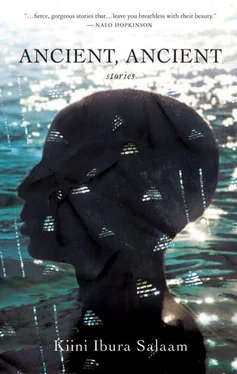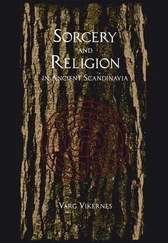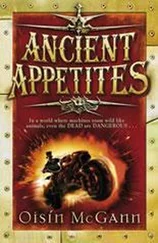Kiini Ibura Salaam
ANCIENT, ANCIENT
Stories
This collection is dedicated to humanity’s ancient urges, and to the ancient truths that reside in each one of us.
Annunciation
by Nisi Shawl
Be not afraid.
Angels of longing arise from these pages, tugging at your heart, your tongue, testing your nerves, teasing your brain. Bravery is the best way to meet them. I know this from experience.
In 2001, Kiini Ibura Salaam attended the Clarion West Writers Workshop in Seattle. As a classroom volunteer, sorting and collating participants’ manuscripts, I interacted with her, for the most part, on the surface of things. I retain an impression of her physical presence as a serene steadiness. A beautifully embodied author-in-training, serious of mien, she wore the poise of a poet, the quiet calm of a traveler who knows she has reached a new land and waits expectantly for surprise.
But in a way I was acquainted with Kiini before this face-to-face encounter. We shared the Table of Contents of the first Dark Matter anthology, which was published a year earlier. So I had read her Dark Matter story “At Life’s Limits,” and I was quite aware that deep down, this calm held surprises of its own: strangely refracted glimpses of—of what? Smoke more dangerous than fire? Moth-winged vampires, gentle yet implacable, tragically susceptible to poisonous disbelief? And dance as speech, and orgasm as an alternative to murder—was that really—
When I opened up that anthology and came across what Kiini was doing, I had had to look unflinchingly. I’d had to grasp what she was saying. I’d had to feel it, to know it. Feeling is more powerful than fear. Knowledge is joy.
“Ferret” appeared on the Infinite Matrix website in 2003. Its depiction of a generation ship guided by gut-dwelling oracular animals proved to be just as simultaneously unsettling and enticing as that earlier story.
In 2004, my work kept company with Kiini’s twice more. Mojo: Conjure Stories ’ editor Nalo Hopkinson published her “Rosamojo,” a ghost story that continues past the point where the heroine avenges herself on a father she knows will never stop hurting her.
In Dark Matter 2 , Sené, the heroine of “Desire,” is a crack-skinned mother of twins set suddenly, magically afire, burning with rekindled sexuality; her adventures alongside a goat-legged sub-Saharan Pan and a seductively crocodilian Venus remind her—and her audience—of the power of fleshly gratification. Let us never forget it.
That same year an interviewer asked me what changes I predicted in sf as a result of the recent influx of Afro-diasporic writers. “Everything is going to get a lot sexier,” I said. Was I thinking of Kiini’s work? Not consciously. I could have been, but I had responded without thinking.
My answer disturbed me even as I gave it, even as I knew it was right. Sexualized stereotypes of African-descended peoples abound. Was I internalizing and validating our exoticization? Was I glorifying our oppression?
I have had seven years to consider what I said. I stand by it, and I recognize Kiini Ibura Salaam as an excellent example of my meaning.
Stereotypes are untrue. Sometimes, though, they bear truth’s imprint. Sometimes they spring up from what truth has crushed down. As they manifest they can co-opt and mispurpose inescapable realities. And that’s what happened with the relationship between sexuality and those of us descended from black Africans. Despite its degradation, despite censorship, despite denial, sexuality is holy and powerful. Sexuality is ours. As African-descended people we possess it—without stealing it or depriving anyone else of their own. It is our divine right.
Sexuality is a form of sensuality, an intensification of it. Distinguishing between sexual feelings and sensual ones has never seemed that important a task to me. All encounters are sensual and all are sexual. As Luisah Teish, priestess in the West African Ifa tradition, once said, “I’ll fuck a plant if you show me the right one.”
Sexuality-cum-sensuality is the experiential link between mind and matter, the vivid and eternal refutation of the alleged dichotomy between them. This understanding is the foundation of my 2004 pronouncement on the burgeoning sexuality implicit in sf’s Afro-diasporization. It is the core of many African-based philosophies. And it is the throbbing, glistening heart of Kiini’s body of work.
This book is alive. Be not afraid.
I’ve mentioned only a few of the stories awaiting you within these pages, only those I’ve read outside of them. Some of the rest were previously published prior to “At Life’s Limits.” Some, after. “Ancient, Ancient,” the collection’s title story, appeared in 2002, but till now its undulating metal had not distracted me and its honey went untasted. My favorite piece is one of three original to this collection, “Pod Rendezvous.” A long and entrancing look at the last libertine hours of a future female who must dedicate her remaining life to selfless nurturing, it swoops on gossamer contrails from crèche to club, from finger-shoveled cafeteria food to bars dispensing star juice. It is the book’s final story. At its end the heroine disappears, a bright spark flying out of sight, and the story is done but not over, or over but not yet done. The pull, the sometimes literally visceral attraction of what Kiini does with words, continues on beyond them.
There is no easy comfort here. No good stopping place, not even at the conclusion of that last sentence. Satisfaction serves only as a base for further explorations. Waves of sensation wash ceaselessly against just-bearably-sensitized skin. Resolution rolls over to reprise. Finishing one story and beginning the next, we are, like Laki, the heroine of “Pod Rendezvous,” merely departing one mysterious path for another. We tread where angels do, or vampires, or gods, or beasts, or nameless monsters. We go to where the power is, the flesh. The knowledge and the joy.
Be not afraid. Be glad.
Sené. Pregnant Sené. Sené of the tired skin. Sené whose face held a million wrinkles, each one etched deeply as if carved over the course of forty years. Sené whose blood was only twenty-four years young.
< Faru, Faru running through the bush. >
The shining eyes of her boys made her smile, but not much else touched her. Not a full-throated bird’s song, not the sun peeking pink at dawn, not her husband’s fleeting caresses.
< Faru leapt right, darted left. His hoof slipped, and his hind legs buckled. Faru stamped his front hoof, shook himself off, and leapt up again. >
Sené had hard-working hands: dry, cracked, bloated. With them she beat the dirt out of her family’s cloths, scaled fish, pounded root vegetables, carried crops to her husband’s mother, and avoided touching herself.
< Thin branches whipped against Faru’s face as he ran. Faru, the flawless. Faru, the godly. Faru reeking of thick sensuality. His huge goat eyes darted back and forth. His god’s heart beat a fearful rhythm in his chest. His lips lay open in a pant. Desire—his and his sister Quashe’s own special force—throbbed through his skinny goat legs. Desire. That which made Faru who he was.
Faru, Faru running through the bush. >
Sené’s hands were always busy. Just now, they were sweeping out the corners of the cliff dwelling she, her husband Na, and the two boys called home. Now her hands were rolling up the sleeping mats and tucking them away. Now they were building a fire.
< Faru heard the thump, thump of Laloro thundering behind him. Laloro, great god of disease. Faru did not look back. He reached the end of the bush and teetered on the edge of the cliff. >
Читать дальше












